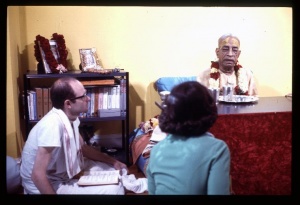SB 10.81.12: Difference between revisions
(Vanibot #0018 edit: make synonym terms in Sanskrit italic in SB - Vanisource) |
(Vanibot #0054 edit - transform synonyms into clickable links, which search similar occurrences) |
||
| Line 23: | Line 23: | ||
<div class="synonyms"> | <div class="synonyms"> | ||
''brāhmaṇaḥ'' | ''[//vanipedia.org/wiki/Special:VaniSearch?s=brāhmaṇaḥ&tab=syno_o&ds=1 brāhmaṇaḥ]'' — the brāhmaṇa; ''[//vanipedia.org/wiki/Special:VaniSearch?s=tām&tab=syno_o&ds=1 tām]'' — that; ''[//vanipedia.org/wiki/Special:VaniSearch?s=tu&tab=syno_o&ds=1 tu]'' — and; ''[//vanipedia.org/wiki/Special:VaniSearch?s=rajanīm&tab=syno_o&ds=1 rajanīm]'' — night; ''[//vanipedia.org/wiki/Special:VaniSearch?s=uṣitvā&tab=syno_o&ds=1 uṣitvā]'' — residing; ''[//vanipedia.org/wiki/Special:VaniSearch?s=acyuta&tab=syno_o&ds=1 acyuta]'' — of Lord Kṛṣṇa; ''[//vanipedia.org/wiki/Special:VaniSearch?s=mandire&tab=syno_o&ds=1 mandire]'' — in the palace; ''[//vanipedia.org/wiki/Special:VaniSearch?s=bhuktvā&tab=syno_o&ds=1 bhuktvā]'' — eating; ''[//vanipedia.org/wiki/Special:VaniSearch?s=pītvā&tab=syno_o&ds=1 pītvā]'' — drinking; ''[//vanipedia.org/wiki/Special:VaniSearch?s=sukham&tab=syno_o&ds=1 sukham]'' — to his satisfaction; ''[//vanipedia.org/wiki/Special:VaniSearch?s=mene&tab=syno_o&ds=1 mene]'' — he thought; ''[//vanipedia.org/wiki/Special:VaniSearch?s=ātmānam&tab=syno_o&ds=1 ātmānam]'' — himself; ''[//vanipedia.org/wiki/Special:VaniSearch?s=svaḥ&tab=syno_o&ds=1 svaḥ]'' — the spiritual world; ''[//vanipedia.org/wiki/Special:VaniSearch?s=gatam&tab=syno_o&ds=1 gatam]'' — having attained; ''[//vanipedia.org/wiki/Special:VaniSearch?s=yathā&tab=syno_o&ds=1 yathā]'' — as if. | ||
</div> | </div> | ||
Latest revision as of 20:02, 17 February 2024

A.C. Bhaktivedanta Swami Prabhupada
Please note: The synonyms, translation and purport of this verse were composed by disciples of Śrīla Prabhupāda
TEXT 12
- brāhmaṇas tāṁ tu rajanīm
- uṣitvācyuta-mandire
- bhuktvā pītvā sukhaṁ mene
- ātmānaṁ svar-gataṁ yathā
SYNONYMS
brāhmaṇaḥ — the brāhmaṇa; tām — that; tu — and; rajanīm — night; uṣitvā — residing; acyuta — of Lord Kṛṣṇa; mandire — in the palace; bhuktvā — eating; pītvā — drinking; sukham — to his satisfaction; mene — he thought; ātmānam — himself; svaḥ — the spiritual world; gatam — having attained; yathā — as if.
Translation and purport composed by disciples of Śrīla Prabhupāda
TRANSLATION
[Śukadeva Gosvāmī continued:] The brāhmaṇa spent that night in Lord Acyuta's palace after eating and drinking to his full satisfaction. He felt as if he had gone to the spiritual world.